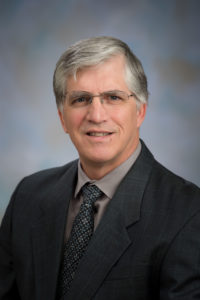The Institute of Electrical and Electronics Engineers (IEEE) has named Colorado State University Electrical and Computer Engineering Professor Stephen Milton one of its 2017 Fellows for his contributions to free-electron lasers (FELs). Milton also holds a joint appointment in the Department of Environmental and Radiological Health Sciences, in the College of Veterinary Medicine and Biomedical Sciences.

With more than 400,000 IEEE members in 160 countries, elevation to the status of Fellow is reserved annually for less than 0.1 percent of its members. More than 40 percent of ECE faculty at CSU hold the extraordinary distinction.
“Being named an IEEE Fellow is considered one of the most important achievements in our field,” said ECE Department Head Tony Maciejewski. “I am proud of Professor Milton for his groundbreaking work that paved the way to this prestigious career milestone.”
Pioneering contributions to free-electron lasers
Since the early days of his career, Milton has been on a quest to push the frontiers of FELs – a powerful type of light source in which a laser beam is generated from clusters of oscillating relativistic electrons that emit coherently. From understanding the mechanism of why we age, to bolstering missile defense, FELs are revolutionizing science, and Milton has been at the forefront of the movement. His breakthrough discoveries and techniques laid the groundwork for bringing high-quality light to a broad user community.
Among his many firsts, Milton demonstrated the first FEL operating from a self-amplified seed of light that grows to extreme intensities. Because of this novel advancement, Milton was appointed to lead the design, engineering, and construction of the $55 million magnetic device – the undulator magnet system – for the Linac Coherent Light Source (LCLS), the world’s first X-ray FEL. Considered one of the most complex and successful scientific instruments ever built, the LCLS resides at the SLAC National Accelerator Laboratory, a facility supported by the U.S. Department of Energy and operated by Stanford University. Milton also led the final design, construction, and initial commissioning of the world’s first high-gain, harmonic-generation FEL user facility, FERMI@elettra.
Collaborations to advance science and medicine
In addition to using particle accelerators for light sources, Milton is engaged in multidisciplinary collaborations that leverage other genres of machines to advance medical applications and enable big science endeavors in high-energy physics. Using particle accelerators as a key tool, Milton is working in partnership with a team of researchers in CSU’s College of Veterinary Medicine and Biological Sciences to launch a cancer therapy and research institute aimed at providing free-of-charge radiation therapy for humans and companion animals.
Milton, who received a bachelor’s degree in physics from the University of California-Davis and a Ph.D. in physics from Cornell University, is the recipient of the IEEE Particle Accelerator Science and Technology Award, and he is a Fellow of the American Physical Society. Milton currently serves on the National Academy of Sciences committee to evaluate the status and future of ultrafast, high-power lasers in the United States.
About the IEEE
Dedicated to the advancement of technology, the IEEE publishes 30 percent of the world’s literature in the electrical and electronics engineering and computer science fields, and has developed more than 1,300 active industry standards. The association also sponsors or co-sponsors nearly 1,700 international technical conferences each year. For more information, visit www.ieee.org.